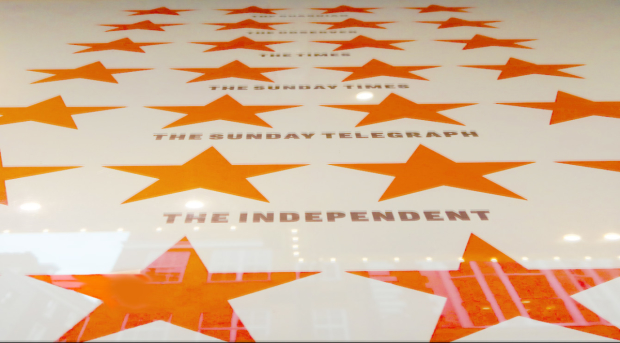
I've been thinking a lot about star ratings recently.
The issues that are grappled with below have certainly been grappled with before, and likely will be grappled with for a while to come.
They have also been heightened somewhat in the pandemic – a time when any show that successfully manages to rehearse, film and organise a coterie of creatives and performers all before an audience (either on-line or in-person) is even considered deserves medals, let alone stars. Fellow writer Fergus Morgan did a fantastic job exploring why we should all be a bit kinder with our criticism during the pandemic.
Over the last few months, a couple of two-star reviews have led a lot of Twitterzens to argue that these five-pointed critters should be abolished – if not forever, then while venues are locked down. It's a reasonable request and some have seen its merit – Time Out for example, ceased all star ratings for stage shows for a bit last year.
After a recent outcry over a musical's streamed run, I thought it was time to write something.
I think, perhaps, I have more of a foot in both camps that most. Back in 2018 I wrote a play, Nine Foot Nine, that critics covered in The Stage, The Guardian, Metro'' and more – we even had a freelancer review it on WOS, commissioned by the former editor of this parish.
We toured to amazing venues in London, Bristol, Manchester and Edinburgh, with some lovely feedback, solid sales and all made some brilliant friends along the way.
Both before that show and since, I've dished out well over 100 reviews myself on WOS –and about the same again as a young whippersnapper of a blogger before that. In effect, I've both been reviewed and had to pass comment on a variety of shows – from titanic 2000-seater spectacles to intimate six-person encounters in Edinburgh basements.
There are no two ways about it: being reviewed can be horrible. The experience of someone dismantling something that a brilliant team of collaborators has spent months agonising over and assigning it a numeral value's worth is often objectively masochistic. I've seen friends train for years for their faces to land slap bang next to solo-star savages during their professional debuts.
Nine Foot Nine definitely changed my approach to reviewing. Perhaps it softened me – some may call it blunted. But whenever I write anything now I think about the product not simply as an hour or two's experience but a year, sometimes a decade's discussion.
It's hard to forget the image of an excitable chat over a mug of tea that spawns a scene, or a lovingly-produced model box that gives a creative team a visual impulse.
The art of reviewing, of taking a living, breathing experience that changes with every performance and carving it into a static, ironclad assessment, is therefore always a bit flawed. Critics have to live with that theoretical flaw on a nightly basis.
I don't think that star ratings are necessarily a bad thing however – or the cause of the issue. They are almost certainly unwieldy and, in the wrong hands, can furrow brows and hit where it hurts.
But words and attitudes hurt more, from experience. Nine Foot Nine got some solid write-ups – about as well as a debut play might expect. Most of that was down to an incredible creative team: director Helena Jackson, lighting designer Jessica Hung Han Yun, sound designer / composer Nicola Chang, set designer Verity Johnson and producer Josie Shipp. Each was saint-like, seeing the best in a beleaguered text and transforming it into a rip-roaring experience – that the cast then took and ran to dimensions I didn't know existed.
But one write-up has stuck with me over the last three (christ) years. I can't even remember what star rating they gave the show, or if they even gave the show a star rating, but I remember the words: describing the language as giving "the jarring sensation that people don't talk like that in real life".
Maybe I was a fool for reading reviews but the unspoken truth is that almost everyone does it – especially those who say that they don't.

A thick skin can make you impervious to an apathetic audience: it might not have been their day. But reading those words, they cut through. I wanted either the run to end or to just run away. I felt like I'd let my team down. That they were making this piece in spite of the writing. I didn't sleep for a while.
The idea that something I'd written made someone feel that way was a bit loathsome. I've stopped writing plays since and, given how awfully embarrassing, mortifying, that blogger's sentence felt to read, will probably never do so again. Maybe that's for the best.
So yes, star ratings can be horrible, mean things. On the plus side, they can give your show a quick marketing boost and you can also slap them on the posters/ e-shots. You might even even sell a bucket load more tickets as a result, or give yourself an extra foothold in a funding bid. From memory, we saw a big up-take in sales after a three-star Fringe review in The Guardian.
Stars don't also tank a show if there's enough audience support: We Will Rock You was punished by reviewers but broke records. Compare that with over the Atlantic, where stars aren't even used, and a New York Times mauling can mean an early end.
But it's the attitude behind the reviews that matters more. Even though it may not be intentional, sometimes I feel as though criticism that isn't constructive is just cruel. I don't think critics need to be adversarial so much as slightly cynical cheerleaders: yes they'll raise their pom-poms if required, but they are entitled to sit there stoney-faced as well.
It's the thinking behind these reviews that may sometimes need to be re-examined – especially when writing about those creating in the midst of intense adversity, pandemic or otherwise. An encouraging three-star, or even two-star review can mean worlds more than a blasé four star: "you didn't really stick the landing much this time but your voice matters, so give it another try."
But for now, though, don't just rail against stars – think about the whole critical eco-system, and what more could be done. Criticism isn't exempt from innovation, and it will take an industry to push for it.












